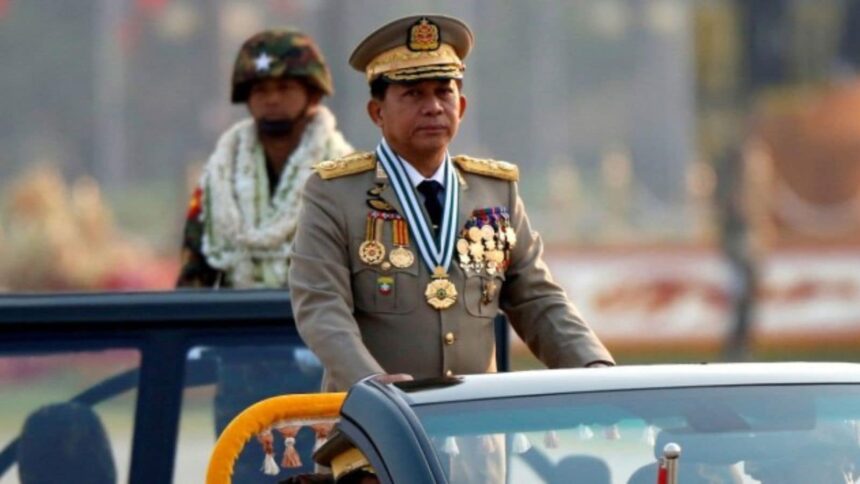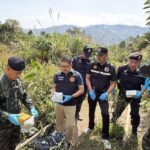NAYPYIDAW, Myanmar – On Thursday, Myanmar’s military rulers, led by Senior General Min Aung Hlaing, said the state of emergency that began after the February 2021 coup would end. The generals claimed this change was a step closer to democracy, with power handed to a so-called civilian-led interim government.
In reality, Gen Min Aung Hlaing stayed in charge as acting president and military chief. State news listed a new group of 30 officials and an 11-member election commission to organize elections expected in December 2025. Yet, those watching from abroad and within the country see this as another trick to keep military control while Myanmar’s crisis deepens, violence grows, and the regime faces more isolation.
The military’s statement aired on MRTV and followed years of unrest since the army removed Aung San Suu Kyi’s National League for Democracy (NLD) from power.
The generals said the 2021 coup was meant to fix alleged fraud in the 2020 election, even though outside observers found no such evidence. Since then, Myanmar has only seen growing conflict. Armed groups and the People’s Defence Forces (PDF), loyal to the opposition National Unity Government (NUG), continue to fight the junta.
The promise to end the emergency law and hold elections has been met with doubt. U Kyee Myint, a human rights lawyer forced into hiding, described the shift in power as “just moving authority from one hand to the other.”
Gen Min Aung Hlaing’s Grip on Power
Min Aung Hlaing leads the new National Security and Stability Commission, which is mostly filled with his loyal officers, locking in military influence. The now-disbanded NLD refuses to take part in the planned elections and calls them a fraud.
Analysts believe the real aim is to win a stamp of approval from the outside world. A Southeast Asian diplomat said on condition of anonymity that even a flawed election could convince some countries to restore ties with Myanmar. But many say talk of a new “multiparty democracy” means little when the free press is banned, thousands of critics, including Aung San Suu Kyi, remain jailed, and the whole system favours those in uniform.
Min Aung Hlaing, who set the 2021 coup in motion, has kept power locked in his hands. Born in Magway’s Minbu, he climbed through military ranks and became commander-in-chief in 2011. He has ensured that the army, or Tatmadaw, keeps a large part of parliament and key ministries through the 2008 constitution, all written with military interests in mind.
The coup happened after the NLD trounced the army’s chosen party in 2020. Close to retirement, Min Aung Hlaing wanted the presidency, but Aung San Suu Kyi refused to support him. His answer was the coup, which collapsed hopes for democracy and sent Myanmar into civil war.
Even after forming an interim administration, Min Aung Hlaing holds on to almost all the power as both acting president and military chief. Stepping aside as prime minister changed nothing; state news made clear he remains in control. Social media posts reflect the mood, with many pointing out that the general keeps all key roles.
Aung San Suu Kyi: From Leader to Prisoner
Aung San Suu Kyi,80, the country’s most recognized democracy figure and Nobel laureate, remains in custody. Since being taken during a dawn raid in 2021, she has faced a raft of charges, adding up to 27 years in prison. United Nations experts have called her trials unjust and political.
Suu Kyi lives under harsh conditions with little contact and poor access to healthcare. Despite her global reputation taking a hit after defending the military’s actions against the Rohingya, a 2020 poll found strong trust in her among most people in Myanmar. Her ongoing detention shows how much the military fears her influence.
The once hopeful NLD has been broken up, with leaders jailed or forced out. The National Unity Government, made up of former lawmakers and ethnic representatives, is trying to carry on, but Suu Kyi’s unique standing complicates the group’s challenge.
Since the coup, the military has fought back against any form of protest or resistance. Amnesty International says over 6,000 civilians have died, with more than 20,000 locked up and millions now without homes.
The army’s tactics include air raids, targeting villages, and executions of activists, which have sparked international outrage. In 2022, the junta’s execution of four pro-democracy leaders marked the return of the death penalty, drawing condemnation from both ASEAN and Western governments.
In late 2023, resistance groups like the Arakan Army and Myanmar National Democratic Alliance Army launched Operation 1027, which put real pressure on the military. They took several towns and army bases, including the important headquarters in Lashio, by August 2024.
The junta admitted to pulling back troops, a rare move that showed the pressure they faced. As the army turns to bombing and artillery, more civilians are caught in the middle, with older residents comparing the destruction to wartime years gone by.
Facing Questions Over War Crimes
The international courts are now looking closely at Min Aung Hlaing’s record. In November 2024, the International Criminal Court requested his arrest for crimes against humanity, linked mostly to the 2017 crackdown on the Rohingya.
United Nations investigators earlier said he carried out acts aimed at destroying this minority group. Courts in Argentina have also issued warrants for both Min Aung Hlaing and Suu Kyi, though her case is disputed due to her reduced role.
Groups such as Amnesty International continue to call for bans on weapons and jet fuel to stop the army’s campaign. A United Nations resolution in April 2024 pressed for full cooperation with the ICC and further collection of evidence. Many are unhappy, though, that the ICC’s investigations do not cover crimes since the 2021 coup.
Isolated from the West, Min Aung Hlaing is turning more to China and Russia for support. China publicly backed the junta’s “development plan” and has helped broker brief ceasefires, even though hostilities soon resumed. The military is wary of China’s influence and possible support for ethnic groups, but it still relies on Chinese trade and diplomatic cover.
Russia sells arms to Myanmar and has strengthened military cooperation with the regime. Min Aung Hlaing has travelled to Moscow and arranged joint exercises. While Singapore has pulled back its role in military trade, Thailand has become a new supplier.
These relationships protect the generals from international backlash and help Min Aung Hlaing hold on, even as the army loses ground.
Myanmar’s Uncertain Future As Sham Elections Near
With elections set for December, almost no one expects a fair contest. The military’s record of controlling every step from writing the 2008 constitution to the 2021 coup shows little will change. Martial law controls more than 60 areas, the media can’t report freely, and nearly all opposition leaders are jailed.
World leaders now face a hard choice: negotiate with the junta to ease suffering or keep up pressure through sanctions. The United Nations passed its first Security Council resolution on Myanmar since its independence in 2022, but splits between China and Russia mean global action is slow.
The U.S. has passed the Burma Act, which applies sanctions and sends help to support democracy, but global attention is fading.
For Myanmar’s people, the generals’ move gives little reason for hope. As student activist Si Thu Tun said back in 2021, “Our country was a bird just learning to fly. Now the army broke our wings.” Four years later, that frustration remains.
Despite promises of democracy, Myanmar is left with broken dreams, empty villages, and a nation still under military rule.














